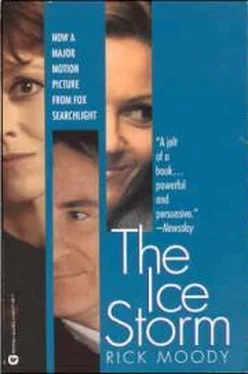For Hy,
Peggy,
Meredith,
and Dwight
SO LET ME dish you this comedy about a family I knew when I was growing up. There’s a part for me in this story, like there always is for a gossip, but more on that later.
First: the guest room, with the orderly neglect of all guest rooms. Benjamin Paul Hood- the dad in what follows — in the guest room. In the house belonging to Janey and Jim Williams, just up the street from Hood’s own comfortable spread. In the most congenial and superficially calm of suburbs. In the wealthiest state in the Northeast. In the most affluent country on earth. Thanksgiving just past and quickly forgotten. Three years shy of that commercial madness, the bicentennial.
No answering machines. And no call waiting. No Caller I.D. No compact disc recorders or laser discs or holography or cable television or MTV. No multiplex cinemas or word processors or laser printers or modems. No virtual reality. No grand unified theory or Frequent Flyer mileage or fuel injection systems or turbo or premenstrual syndrome or rehabilitation centers or Adult Children of Alcoholics. No codependency. No punk rock, or postpunk, or hardcore, or grunge. No hip-hop. No Acquired Immune Deficiency Syndrome or Human Immunodeficiency Virus or mysterious AIDS-like illnesses. No computer viruses. No cloning or genetic engineering or biospheres or full-color photocopying or desktop copying and especially no facsimile transmission. No perestroika. No Tiananmen Square.
Much was in the recent past. Jimi Hendrix, Janis Joplin, and Jim Morrison were in the recent past. Four dead in Ohio, one at Altamont. Nixon had shipped arms to Israel for the ’72 war, but slowly, slowly. The Paris Peace talks had lapsed; Kissinger had become Secretary of State — in September. (No Nobel Peace Prize for 1972.) China had joined the U.N.; Nixon had gone to visit.
In the recent past, buildings had already been occupied and abandoned at Columbia and Berkeley and everywhere else. Now Abbie Hoffman was in hiding. Now Jerry Rubin was writing for the New Age Journal. Angela Davis had been acquitted. The Beatles were recording solo albums. The war in neutral Cambodia was heating up. (The Khmer Rouge would take Phnom Penh. Lon Nol would soon be deposed.)
The energy crisis was getting under way. Rose Mary Woods had just accidentally erased eighteen and a half minutes of a subpoenaed conversation. (The White House released a photograph: Woods reached for the phone while absently stretching to depress an erasing pedal.)
None of this, though — not the Watergate Hotel and its palette of hypocrisy, coercion, and surveillance, not Jonathan Livingston Seagull, whose movie had just opened, not transactional analysis or Gestalt therapy-troubled Benjamin Hood’s sanguine and rational mind. Hood waited happily for his mistress. In her guest room. In those dark ages.
Billy jack was the most popular film of the year.
Imperiously, Janey Williams had strode from the guest room to install her birth control device. Imperiously. With a subliminally pervasive trace of something like resentment. It was the bum note in the sweet song of this tryst, but Hood didn’t notice it. His thought was this: with all this innovation, with the simplicity of the birth control pill and the reliability of the IUD, why persist with that rubber stopper?
Well, the delay had its pleasures. It conjured dirty and agreeable fantasies.
The plaid flannel comforter on the bed in the guest room was mussed with the recent tangling of neighborhood kids. An amorous tangling. Hood thought, an adolescent hunting and groping. The sheer, white drapes in the guest room were limp as the bangs of a sad schoolgirl. The dresser drawers were empty but for a skittering mothball and an ancient box of disposable douche. Guest room furniture reminded Hood — as he opened and closed drawers — of the cutaway sets of television soundstages. It was ugly and impermanent stuff. The shag rug, for example, was mustard and forest green. It concealed remnants of cheese bits and bland, tasteless crackers. He might himself have been the culprit here. For there had been one prior encounter with Janey.
On the bedside table a perfect bottle of perfect Finnish vodka glistened perfectly. He had been in this house a hundred and fifty times since the Williamses had moved in. A hundred and fifty times before he ever sought this refuge, the refuge of the guest room. He was grateful and ashamed both. He wished he had stayed at his end of the street. But he was helpless before the itch. This was one way he accounted for it. He had been lonely even in his wife’s arms, lonely in crowds, lonely at meetings, lonely throwing tennis balls for his dog, lonely playing Operation with his kids. He had been lonely during commuter conversations, lonely during late-night heart-to-hearts with old fraternity brothers. His dad, living alone up in New Hampshire, made Hood lonely. The severe landscapes of November made him lonely. Only Janey, for reasons Hood wasn’t likely to analyze, distracted him from this isolation. He was aware that this was a temporary situation, but he felt bound to look into it.
There was more to it than that. In the mirror over the dresser he looked good for forty. Almost forty-next March. Wait a second. His skin was stretched over his paunch. As if someone had cellophaned a constrictive packaging over the youthful Benjamin Hood, soft even then. He was mottled and patchy. He needed a new coat of semigloss. His hair was going. He had worn it short all his life — he had never seen it, really — and now it was gone. His glasses were perched on his tiny, crooked nose like a large, barren tree on a granite outcropping. His minuscule eyes were the color of antifreeze. Okay, he was forbidding to behold. He resembled a longtime funeral director or a salesman of bogus waterfront property. He knew this. He tried to make up for it with kindness and fidelity. He tried.
His erection was subsiding. Right now. His bejeweled weapon of persuasion was subsiding where it used to beckon, at his boxer shorts.
Once his dreams had been songs. He’d been a balladeer of promise and opportunity. The corridors of the financial industry were his. Once he had been the filly before the first race, the cadet before the invasion. He had advanced in the direction of his dreams. But by 1973 desire surprised him at inappropriate moments: during television broadcasts of Southeast Asian massacres, during the Frazier/Ali rematch, when Archibald Cox was fired, when Thomas Eagleton admitted to shock-therapy treatments.
Hood was not here, in this guest room, because he perfumed himself, because he was sunny and joyful. He was here, he opined, because his touch could be cruel. He was masculine and magical and mystical. He was a swordsman. Janey Williams brought it out in him. Having a mistress was like discovering, as an agnostic, the consolations of religion. It was like caving in and having a stiff drink right at the moment the clock strikes four. He felt no need to probe new ways of lovemaking now that he had come out of retirement from love. There was no need to express his feminine side. He preferred the conventional posture. Janey wanted him as he was. (And he heard her footsteps, now, going down the staircase. Perhaps in search of a candy to feed him during the act.)
So he had a little trust. A little trust wasn’t much, but it was something. Trust never overpowered him. Hood was full of dread. And anxiety. Any change in his environment-the failure of Bob’s Stationery in town, for example, or the relocation of Bruce Abrams to some distant Shackley and Schwimmer branch office — filled him with dread. The small failures of life brought him, inexplicably, to the verge of tears, though he always managed to step back from that precipice. He could see desire had grown subtle and strange in the years since he had learned about it. Desire wasn’t about large breasts in Cross Your Heart brassieres anymore. It was about hunting for comfort.
Читать дальше













